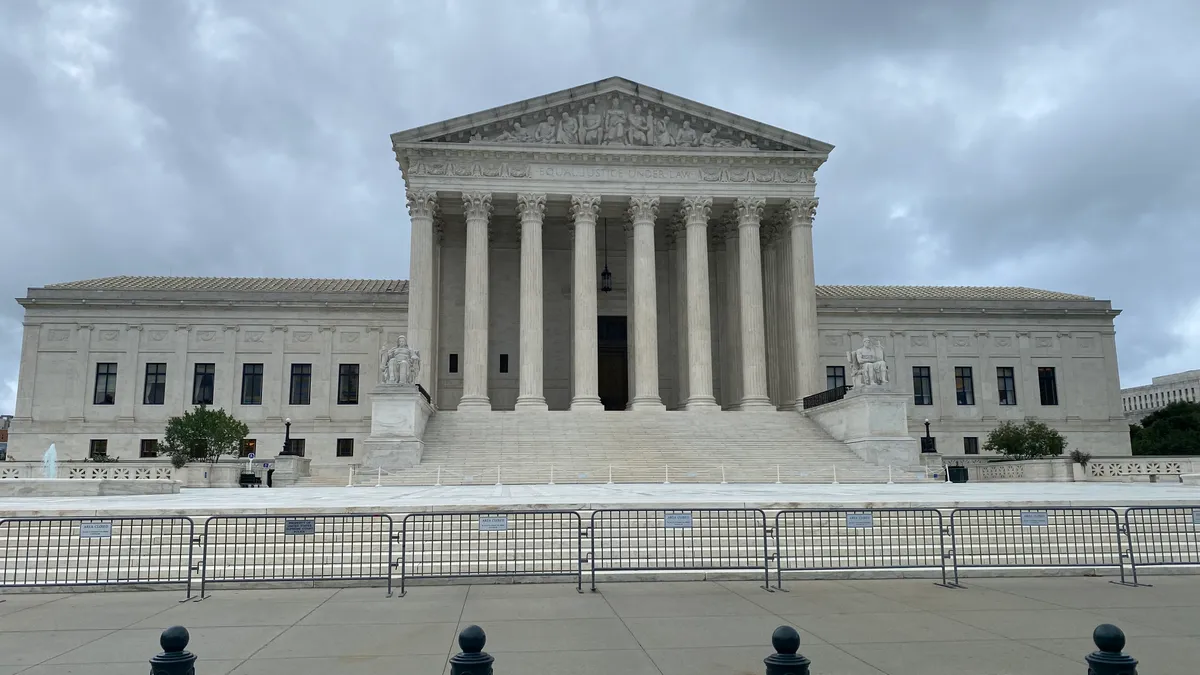Dive Brief:
- The U.S. Supreme Court last week overturned a lower court’s decision, ruling against the International Brotherhood of Teamsters Local 174 in Washington state employed by Seattle-based concrete provider Glacier Northwest.
- The union called for a work stoppage in 2017 in response to a collective bargaining agreement’s expiration, while the company was in the midst of mixing concrete into trucks for deliveries, according to court documents. At least 16 drivers who were on their way to pours returned with fully loaded trucks, leading Glacier to take emergency measures to offload the concrete in order to protect the vehicles from serious harm. Glacier asserted that in the process the concrete mix in the trucks was ruined.
- Glacier sued over the ruined material, and the case was dismissed in Washington state court, which ruled it should be decided by the National Labor Relations Board. In an 8-1 decision on June 1, the Supreme Court reversed the decision, saying the court was wrong to dismiss the suit.
Dive Insight:
Because the union knew a work stoppage could harm Glacier’s concrete but it did not take “reasonable precautions” to prevent it, its activity was not protected by the National Labor Relations Law, Justice Amy Coney Barrett wrote for the majority decision.
“The parties agree that the NLRA protects the right to strike but that this right is not absolute. The National Labor Relations Board has long taken the position — which the parties accept — that the NLRA does not shield strikers who fail to take ‘reasonable precautions’ to protect their employer’s property from foreseeable, aggravated and imminent danger due to the sudden cessation of work,” the court wrote in the decision. “Given this undisputed limitation on the right to strike, the court concludes that the union has not met its burden as the party asserting preemption to demonstrate that the NLRA arguably protects the drivers’ conduct.”
The concrete companies and the union have continued to quarrel over labor relations since the 2017 work stoppage, including a monthslong strike which ended a little over a year ago and slowed construction work in the region.
That 141-day strike, which stemmed from wage hike demands by members of Local 174, lasted from November 2021 to April 2022. The members were employed by a variety of local concrete subcontractors that included Stoneway Concrete, Gary Merlino Construction, Cadman Materials, CalPortland/Glacier Northwest, Salmon Bay Sand and Gravel and Lehigh Cement.
Construction projects across the Seattle area went months without concrete, and vital infrastructure like the cracked West Seattle Bridge waited for the dispute to settle.
Despite months of negotiations, the concrete truck drivers returned to work with no new contract.
Now, over a year after that strike’s end, the union has been dealt another blow with the reversal of the lower court’s decision. Teamsters General President Sean O’Brien said in a statement that the ruling “opens the door for corporations to sue their own workers.”
He decried the decision as “shameful,” saying the court ruled “in favor of corporations over working people.”
“The ability to strike has been on the books for nearly 100 years, and it’s no coincidence that this ruling is coming at a time when workers across the country are fed up and exercising their rights more and more,” O’Brien said.
But Noel Francisco, the attorney representing Glacier, told CBS News that the decision "vindicates the longstanding principle that federal law does not shield labor unions from tort liability when they intentionally destroy an employer's property. Our client is entitled to just compensation for its property that the union intentionally destroyed."














